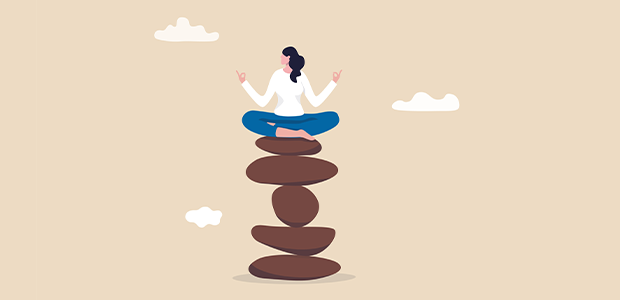
The entrepreneur’s guide to flexible mindfulness
In today's high-speed business landscape, entrepreneurs face unprecedented pressure. The demands of building companies while navigating technological disruption create unique stress patterns that traditional wellness advice often fails to address. After working with founders for over 15 years, I've developed a "flexible mindfulness" approach that fits the entrepreneurial lifestyle.
The 5x5 framework for entrepreneurial wellbeing
The most effective stress management strategy begins with understanding the five fundamental pillars of physical and mental resilience: sleep, nutrition, hydration, movement, and breath. The key insight? Something is always better than nothing. Aim for all five when possible, but never drop below two or three – especially during travel or intense work periods.
Sleep: protect your sleep environment even when hours are limited. Remove devices 30 minutes before bed, keep your room cool and dark, and consider tracking tools like the Oura ring to monitor sleep quality and stress levels. During my busiest times, I still prioritise sleep quality over quantity.
Nutrition: batch-prepare nutrient-dense meals during less demanding periods. When traveling, I rely on AG1 or extra Vitamin C to maintain immune function. Find your reliable nutrition allies for inevitable crunch times rather than surrendering to whatever's convenient.
Hydration: place water bottles strategically throughout your environment. I alternate between water, herbal teas, and coconut water, while limiting added sugars and caffeine beyond my daily coffee. When everything else falls apart during intense travel, proper hydration remains my non-negotiable.
Movement: the best movement practice is one you'll actually do. Mix up your activity – walking meetings, cycling commutes, brief weight sessions, yoga, or even a few planks between calls. During my busiest weeks, three minutes of push-ups in a hotel room maintains this pillar when formal workouts aren't possible.
Breath: your breath is a portable stress-management tool available in any circumstance. When I'm rushing between meetings or stuck in travel delays, three deep breaths create an instant reset. Practice the 4-7-8 technique (inhale for 4, hold for 7, exhale for 8) during transitions.
Implementing flexible mindfulness
Daily seated practice: start with just 5-10 minutes of seated meditation each morning. Consistency matters more than duration – even two minutes is better than skipping entirely. This creates the baseline awareness that enables flexibility throughout your day.
Walking practice: transform necessary walks into mindfulness opportunities. Focus on the sensation of your feet touching the ground or synchronise your breath with your steps. I often use airport walks as my primary meditation during travel weeks.
Transition moments: identify natural transition points in your day and use these as triggers for three conscious breaths. These micro-practices accumulate, preventing stress from becoming chronic.
Flexible application: when I'm traveling between continents for meetings, I might only maintain hydration, breath awareness, and minimal movement. This 3/5 approach sustains me until I can return to my full practice. The key is never dropping to 0/5, which leads to diminished performance and recovery challenges.
Your competitive advantage as an entrepreneur isn't working harder than everyone else – it's maintaining clearer thinking under pressure. By implementing this flexible approach to mindfulness, you create the conditions for sustained innovation, while protecting your most valuable asset: your mind.
For more startup news, check out the other articles on the website, and subscribe to the magazine for free. Listen to The Cereal Entrepreneur podcast for more interviews with entrepreneurs and big-hitters in the startup ecosystem.

